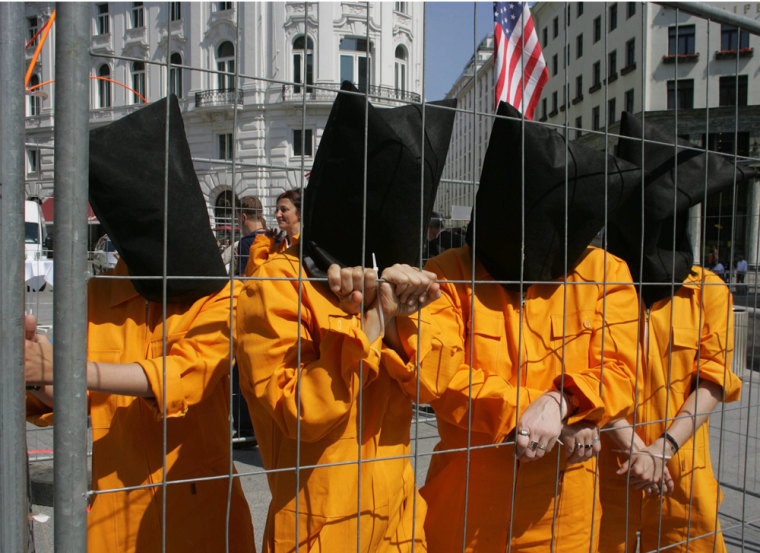Mourners packed the home of a Yemeni who died at the American prison in Guantanamo Bay as his family dismissed U.S. claims he committed suicide and accused prison authorities of murdering him.
Men in traditional robes and headdresses sipped black coffee at the home of Ali Abdullah Ahmed, while veiled women draped in black gathered in a separate section, paying their respect to Ahmed’s parents in a small farming village on the outskirts of Taiz in the mountains of southern Yemen.
“We are happy despite all that happened, and we are proud that our son is a martyr,” insisted Ahmed’s father, Mohammed Abdullah al-Aslami, though his face was stiff and gloomy.
His mother broke down in tears several times.
“I am proud, because with his martyrdom he bestowed high esteem to his family,” she said.
“You can call me the Mother of the Martyr, or the Mother of the Mujahed (holy warrior),” she told The Associated Press, refusing to give her name. “I want my son. I want his body from America to bury him in the land of Muslims.”
Bush: I’d like to close Gitmo
The 28-year-old Ahmed was found dead in his cell on Saturday in the U.S. military prison in Guantanamo Bay, Cuba, where he was taken soon after his capture in Afghanistan in 2003. Two Saudis were also found dead in separate cells.
The U.S. military said the three committed suicide, using sheets and clothes as nooses, in a form of protest. The deaths have fueled demands in the United States and abroad for the closure of the prison, where detainees captured in the war on terror have been held for years without charge.
“I’d like to close Guantanamo,” President Bush told reporters in Washington on Wednesday. “I also recognize that we’re holding some people that are darn dangerous ... Eventually, these people will have trials and they will have counsel,” he added.
Ahmed’s father derided the claim his son committed suicide — an act banned by Islam.
“They (the Americans) lied and then they lied some more. My son is a religious man and a devout Muslim. There is no way he could have killed himself. They killed him,” said al-Aslami, whose long beard was dyed red with henna in the style of conservative Muslims in the region.
Home of ‘murderous hypocrites’
Venting his anger at Bush, al-Aslami said the White House was the home of “murderous hypocrites” — then added, “I respect and love the friendly American people, but they should know more what Bush is doing against the Muslims.”
Al-Aslami said his son left Yemen for Pakistan in 2000 for business and was arrested in 2003 but he received only one letter from him during his detention.
He said his son’s real name was Salah Mohammed Abdullah al-Aslami — and the name used came from false documents he was traveling with.
Al-Aslami said he did not know whether his son was involved with al-Qaida or Taliban fighters who battled U.S. forces in Afghanistan.
The U.S. military said Ahmed was a mid- to high-level al-Qaida operative with ties to key al-Qaida facilitators and senior membership.
From near and far
The elderly al-Aslami paused constantly to answer mobile phone calls from well-wishers. The mourners who gathered in the three-story house, tucked amid wheat fields, flowed in from the village, nearby Taiz and as far away as Ibb, about 100 miles to the north.
Many of them grumbled that the Yemeni government was not doing enough to help the more than 100 Yemenis still being held at Guantanamo. Yemen has largely allied itself with the United States in the war on terror, though Washington has at times criticized its level of cooperation.
In Saudi Arabia, the state-funded Saudi National Human Rights Group blamed the U.S. authorities for the deaths of the two Saudis and cast doubt on their suicides. The Saudi government called for the speedy release of all 134 Saudis still at the prison.
An Afghan delegation that visited Guantanamo said Wednesday that the prison conditions were “humane.” Abdul Jabar Sabhet of the Afghan Interior Ministry said he and his delegation were permitted to speak freely with all 96 Afghan prisoners, and there were “only one or two” complaints.
“Conditions of the jail were humane,” he said in Kabul.
E.U.: Close Guantanamo
The U.N. human rights agency has said the suicides could have been anticipated and the focus should now be on closing the prison.
The European Parliament reiterated that the prison should be closed. The group is expected to raise the issue at an E.U.-U.S. summit in Vienna next week.
The United States is detaining about 460 men at Guantanamo on suspicion of links to al-Qaida or the Taliban. They include 136 Saudis and 107 Yemenis.
